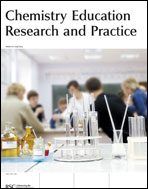Sustainability became a regulatory idea of national and international policies worldwide with the advent of the Agenda 21. One part of these policies includes promoting sustainability through educational reform. With the United Nations World Decade for Education for Sustainable Development (ESD), spanning the years 2005 to 2014, all school subjects are requested to contribute to this reform, including secondary chemistry education. Furthermore, educational reform can only be successful if it takes teachers’ prior knowledge and attitudes into account. Unfortunately in the case of German secondary chemistry education, information about teachers’ knowledge and attitudes is very rare. In order to close this gap, a study using semi-structured interviews with a random sample of 16 experienced chemistry teachers was conducted and the results qualitatively analyzed. These results show that teachers hold positive attitudes when it comes to implementing issues of sustainability and ESD in their teaching. However, the findings also document that teachers are only vaguely informed about the theoretical concepts behind sustainability and ESD. For the most part, the teachers possess almost no theoretically-informed ideas about pedagogies which could be used to implement ESD in chemistry teaching. Reforms in teacher education (pre- and in-service) and the development of appropriate curriculum materials are highly recommended.
You have access to this article
 Please wait while we load your content...
Something went wrong. Try again?
Please wait while we load your content...
Something went wrong. Try again?

 Please wait while we load your content...
Please wait while we load your content...